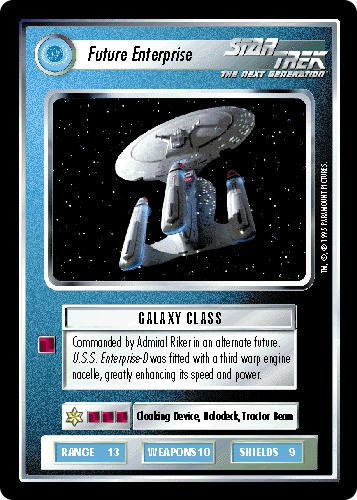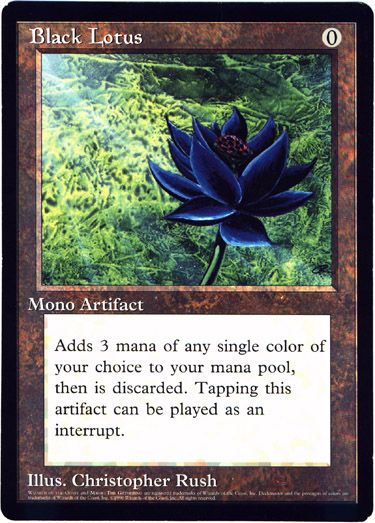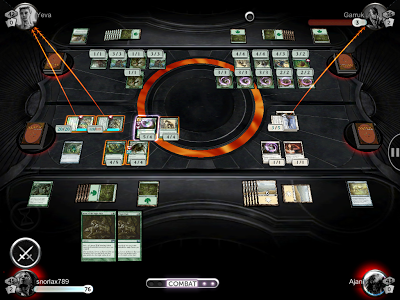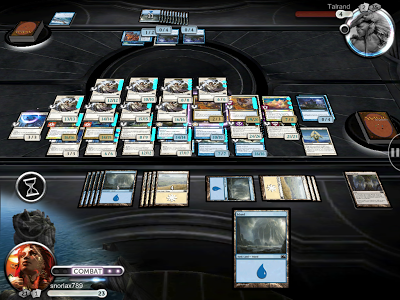Gaming Stories: Magic: The Gathering
I was surprised to see that my opponent was a married, bearded man my age from Williamsburg. I had prepared myself for the worst kind of loud, know-it-all teenager who had too much time but too little patience for an old guy like me. Instead, my opponent was a friendly guy who was seated to my left when I constructed my deck. We both asked for the same colored deck from the tournament organizer, so I knew that this would be almost a mirror match. We shook hands, and he was patient when he pointed out that the card I just played would come into the battlefield tapped, which meant that I had to turn it sideways on that turn and that I couldn’t use the resource it contained to do what I was trying to do. When he beat me two games to none and eliminated me from the tournament, we shook hands again and talked about how our respective wives would react to our tentative re-entries into this addiction called Magic: The Gathering. He said that she was fine as long as he didn’t play more than once a week; I said that I have to get rid of my cards at the end of the tournament because there was no way I could bring them home. We shared a laugh, played a friendly match (he beat me again), and we moved on, him to his next match, me to my wife and kid at home. And that was the summation of my very brief return to Magic: The Gathering, except it wasn’t.
Games on my iPad tend to have very short life spans. I haven’t loaded Civilization Revolution after a torrid three-month affair; even the promise of new buildings and units for various civilizations has not enticed me to return. 10000000 was a beloved game for the month it took me to escape the castle; I loaded it recently and could not find the emotional investment to play it with any seriousness. Puzzles and Dragons kept me up for hours past a decent bedtime and had my iPad glued to my hand for weeks until I decided that I was sick of grinding out money and experience points for my creatures and deleted the game. The only game that has had any success in keeping my attention has been the one with the most unwieldy title, Magic: The Gathering – Duels of the Planeswalkers 2013.
Thinking about Wizards of the Coast’s
Magic: The Gathering brings me back to my days in junior high school when my friends and I would go to a nearby comic book store, head to a windowless and starkly lit second story room, and try out our latest decks. I was not a serious
Magic: The Gathering player; instead, my game of choice was Decipher’s
Star Trek: The Next Generation Customizable Card Game, which is now known by a slightly less cumbersome and more accurate name,
Star Trek Customizable Card Game (and which I’m going to call
Star Trek CCG from here). I drifted away from
Star Trek CCG for the same reason I was never willing to invest myself into
Magic: The Gathering: the barrier to entry to being “good” was too high. Unlike some of my friends who also played
Star Trek CCG, I was not able or willing to pay $125 for a copy of the Future Enterprise card or even more than that for the rare collection of deluxe cards,
The Fajo Collection. So my interest tapered off as Decipher released more expansion card collections to
Star Trek CCG and I eventually boxed my cards up or gave them to friends.
 |
| The object of my intense adolescent desire. |
If I were unwilling or unable to pay what was to an adolescent a significant amount of money for some playing cards in a game that I was emotionally invested in, I certainly wasn’t going to invest a lot of money in order to play Magic: The Gathering with my friends. So I tried my best to create decks with their cast-off cards; I settled on a deck that utilized white and black knights as my creatures. I had some moderate success with it against other surface level players, but there was no way I could compete against players who were willing to spend thousands of dollars to obtain powerful cards like the infamous Black Lotus or Demonic Tutor. So, there was no reason to invest myself emotionally in Magic: The Gathering, and the interest faded away almost completely by the time I moved on to college.
 |
| Black Lotus: the world’s most expensive Magic: The Gathering card. |
Except, as
a recent article in New York pointed out, no one ever really leaves adolescence. This isn’t a case of arrested development, of “man-babies” or
“man-children” who have been the subject of articles and posts in male-oriented magazines and Websites for years. Instead, we’re all traumatized on some level by our experiences in high school. While I wouldn’t say that my brief teenage forays into competitive
Magic: The Gathering traumatized me, they certainly left their mark. Thanks to running head first against the financial barriers to entry in
Magic: The Gathering and
Star Trek CCG, I was (and continue to be) skeptical about paying to play massive multiplayer online role-playing games, to start collecting anything, or to even play free to play games, such as
Puzzles and Dragons or
Kingdom Rush, on my iPad that have In App Purchases. In those cases, I can see the appeal directly conflict with the need to pay more to either keep having fun or to have more fun. The process of learning to leave
Magic: The Gathering and
Star Trek CCG taught me that fun is a disposable commodity.
Years later, I thought that the original Magic: The Gathering – Duels of the Planeswalkers on Xbox Live Arcade would be a good compromise between that ember of desire to play Magic: The Gathering and my unwillingness to significantly invest my money, time, or emotion into the game. For a while, it was a fine substitute; I even got all the achievements in the main version and one of the expansion packs. But the announcement that there would be a sequel with minor improvements a year after the original game’s release soured me again. It was a stark reminder that Wizards of the Coast was more than happy to make an annualized product that wouldn’t address some of my concerns about the player’s inability to modify the decks much, the slow pace of the game, and the game’s general instability. So I bailed on Magic: The Gathering a second time.
By the time I got an iPad and saw that Magic: The Gathering – Duels of the Planeswalkers 2013 (which I’m going to refer to as DotP 2013) was available, I could price my willingness to even try the game at about $10. I downloaded the free version, and since the price to upgrade to a full version was less than $10, the satisfaction to investment ratio seemed to be in my favor. And it did pay itself off when I was able to spawn a gigantic creature to crush my opponents.
 |
| A Primordial Hydra grown to 128 power and 128 health splattered my opponents across the battlefield. |
The satisfaction of growing a creature that large was almost primal.
Since my interest in Magic: The Gathering was rekindled by by DotP 2013, I wondered if there was a way I could dabble in the actual card game again. The recent release of the latest Magic: The Gathering expansion, Gatecrash, meant that there would be special events catered to old players like me who would come back to the game, even if it was for only a little while. A sealed deck tournament, where every player gets an unopened box of cards with which he or she could construct a deck, seemed like the friendliest format for a player who has been away from the game for almost a decade.
While we were constructing our decks, some of the other players at the table asked me how long I had been away. When they heard that I had stopped playing after the fourth edition of
Magic: The Gathering was released, they asked me why I came back. I’m still not quite sure. Perhaps I was inspired by
Steve Heisler‘s
article about his own brief return to
Magic: The Gathering for
The AV Club. Perhaps I was tired of playing against the AI in
DotP 2013. Perhaps I wanted to recapture that little piece of my adolescence that I never had, of winning an actual
Magic: The Gathering tournament, just so I could say that I had done such a thing.
Unfortunately, my bearded, also married opponent put a quick end to that idea. I’ll admit that the ease by which he dispatched me was a little demoralizing, but he at least told me that I could take comfort in the fact that the last match would have been more competitive if I had one more turn to play one of the cards in my hand. I was treated well by all of the other players; while the crowd was predominantly male, it wasn’t aggressively macho. I wish I had an opportunity to speak with some of the women who also played in that tournament, but it seemed like everyone was at least cordial and well-behaved. At the very least, the experience was pleasant enough that I would consider going back to play one more tournament at some point.
Yesterday, my wife asked me what I was doing on my iPad, so I showed her DotP 2013. She was interested in playing, so I walked her through a match against the computer and tried to explain concepts like mana cost and creature abilities. She seemed interested in playing some more, and I mentioned offhand that I still have some physical cards somewhere if she ever wanted to play an actual game of Magic: The Gathering. (I never did manage to get rid of those cards from that sealed deck tournament.) In the meantime, I can still play DotP 2013, where I can create absurd scenarios that lead to my opponent’s defeat like this:
 |
| That’s a lot of very powerful creatures on my side. |





